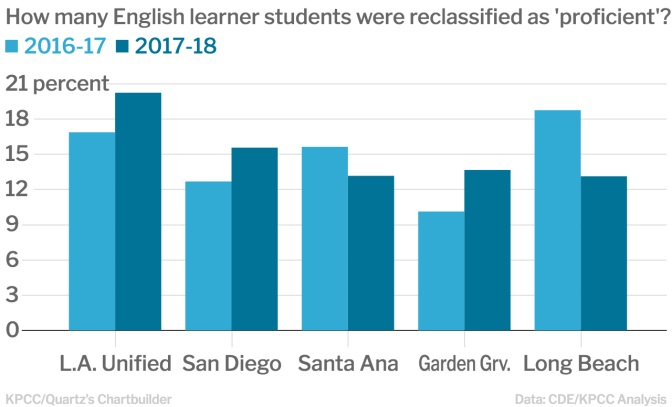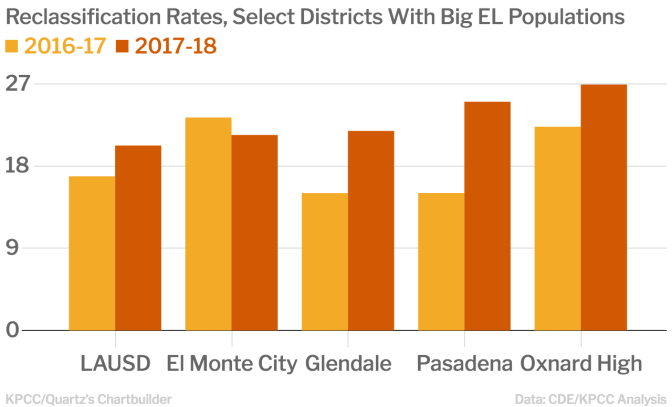This story is free to read because readers choose to support LAist. If you find value in independent local reporting, make a donation to power our newsroom today.
This archival content was originally written for and published on KPCC.org. Keep in mind that links and images may no longer work — and references may be outdated.
English learners are becoming English-proficient at higher rates. How did LAUSD pull it off?
Students in the Los Angeles Unified School District who are still learning English are becoming proficient in their new language at record levels.
In L.A. Unified, 20.7 percent of the students who began the school year as English learners will end the year having been designated as "fluent-English-proficient" — a record high "reclassification" rate, as the state's largest school district recently announced.
If you count the independent charter schools L.A. Unified oversees, the reclassification rate is slightly lower: 20.2 percent — but that mark is still more than 5 percentage points higher than the statewide average, which also rose, according to a KPCC analysis of the data.

Instructionally, the process of reclassifying an English learner can be long and arduous, varying greatly depending on the student. Some students come in needing only to learn the English terms for concepts they've already learned in their home language; others require intensive instruction in the underlying concepts as well as a new language.
But the academic challenges have historically been compounded by a paperwork nightmare.
In order to reclassify an English learner, educators have to ensure the student checked multiple boxes: the student must pass the state's English Language Development test, a separate reading test and earn high enough grades in their English class.
Even after all that, the student's parent must sign off before the English learner can be reclassified. And as recently as three years ago, says L.A. Unified's Hilda Maldonado, educators were tracking all of these milestones essentially by hand.
"Before, every school had to sit and sift through several pages of reports to figure out what each child needed," said Maldonado, who oversees the district's Multilingual and Multicultural Education Department.
But in 2016, L.A. Unified rolled out a new English learner data dashboard — a tool designed to cut through the mess of paperwork. Maldonado said the dashboard played a role in helping L.A. Unified achieve a new record high in its reclassification numbers.
"Because we move the monitoring to the side," Maldonado said, "people stop focusing on the paper-work-like busyness and can concentrate more on looking at how are children learning, how are teachers delivering lessons, are they taking into account the students’ proficiency levels so they can get to the next level."

This school year, California's English learner reclassification rate increased modestly to 14.6 percent — up from 13.3 percent in 2016-17.
L.A. Unified serves a larger population of English learners — more than 143,000 students — than any other district in the state. Roughly one out of every five students in an L.A. Unified school, charter or non-charter, is officially designated as an English learner.
But the challenges are just as great in other school districts. The Hueneme Elementary School District in Ventura County enrolls more than 3,800 English learners — nearly half of the student population — and it achieved a reclassification rate of 20.9 percent.












